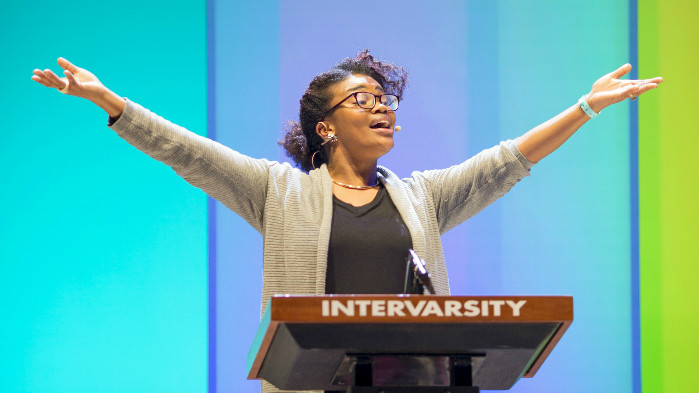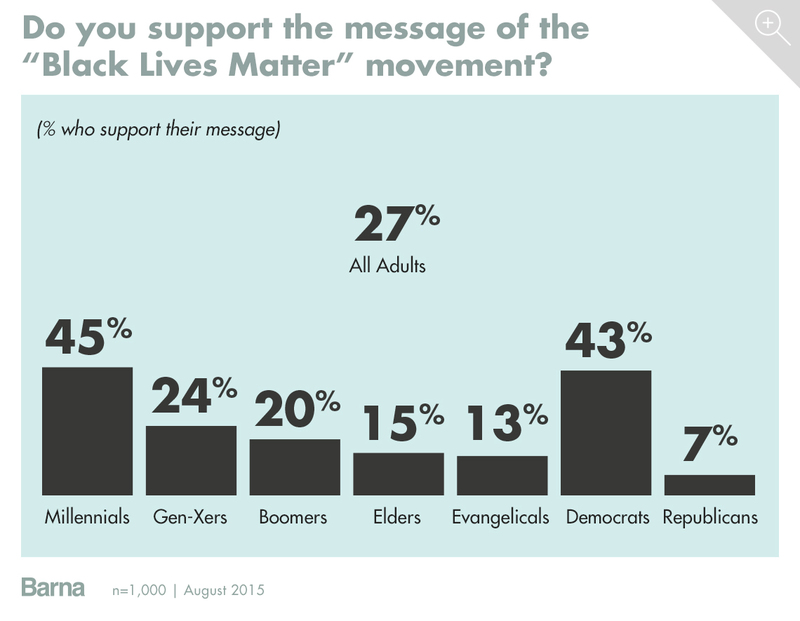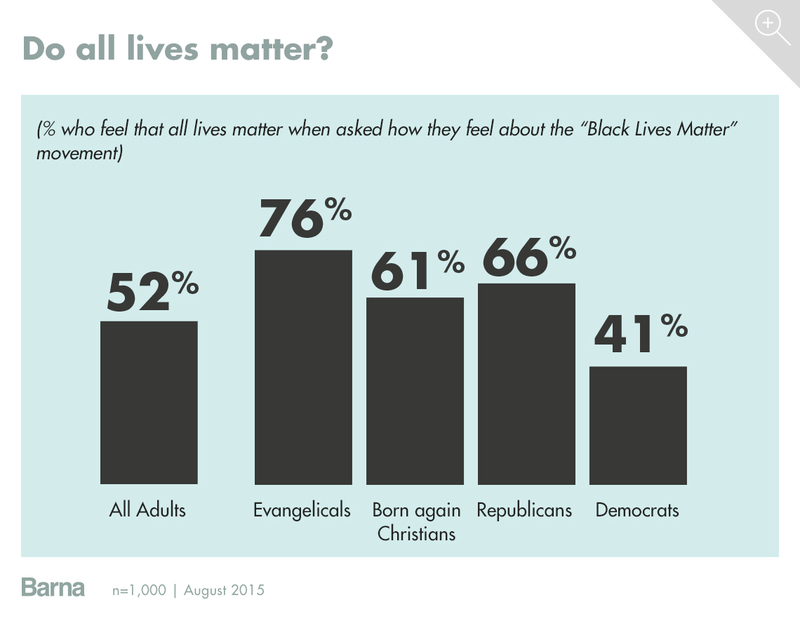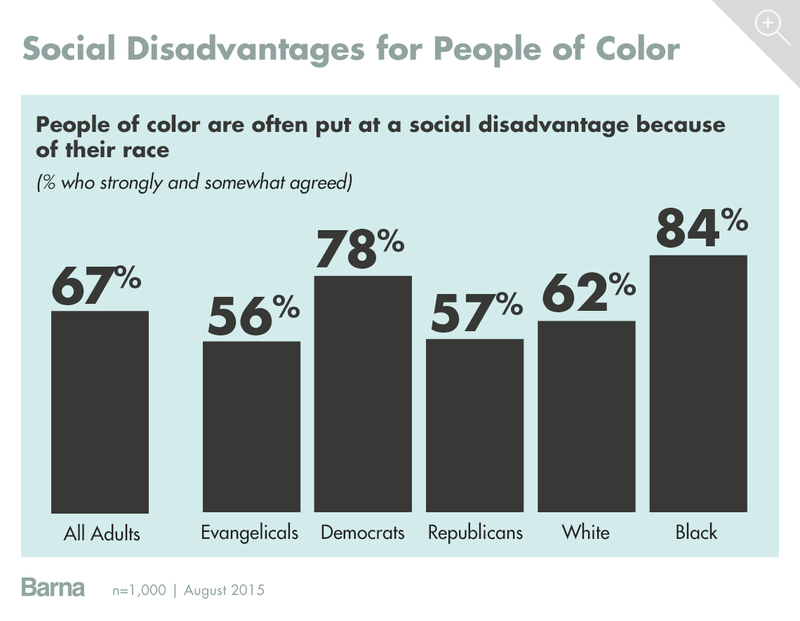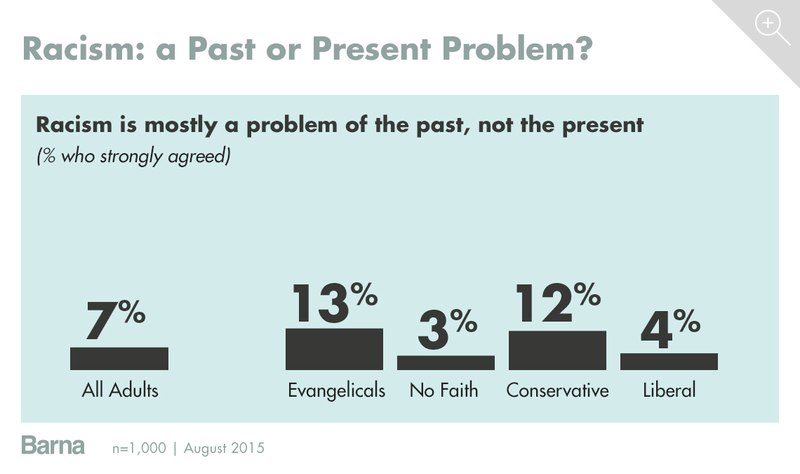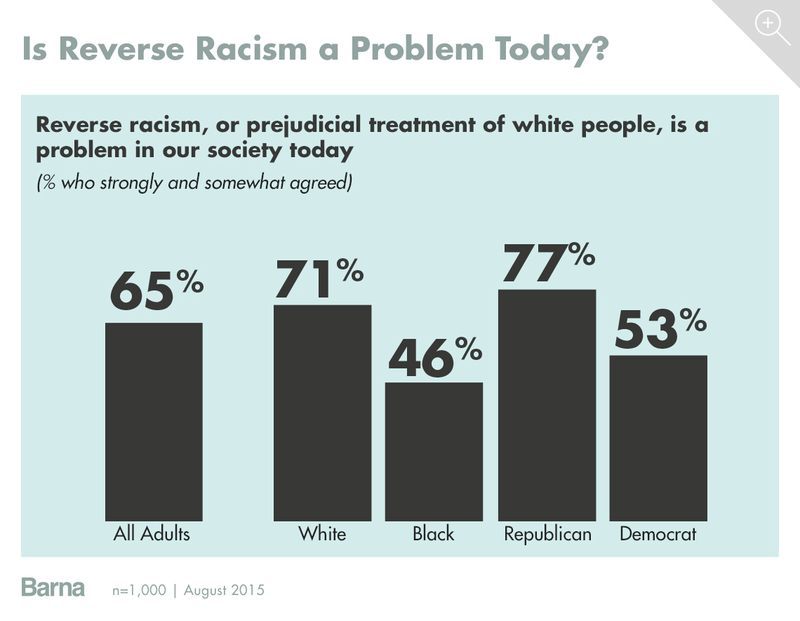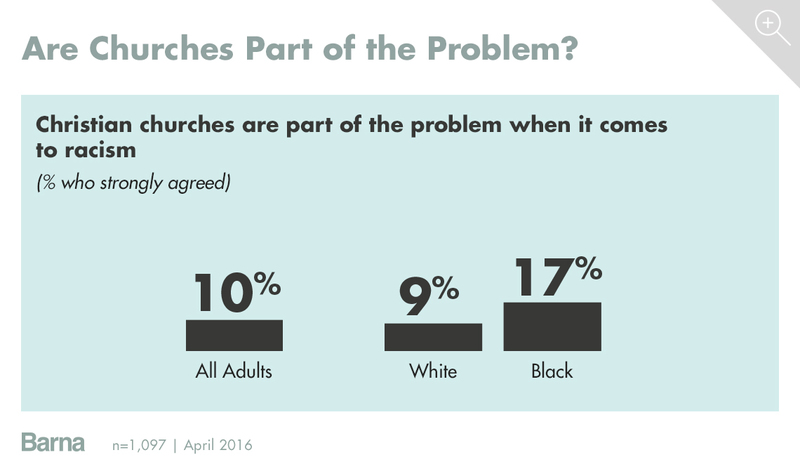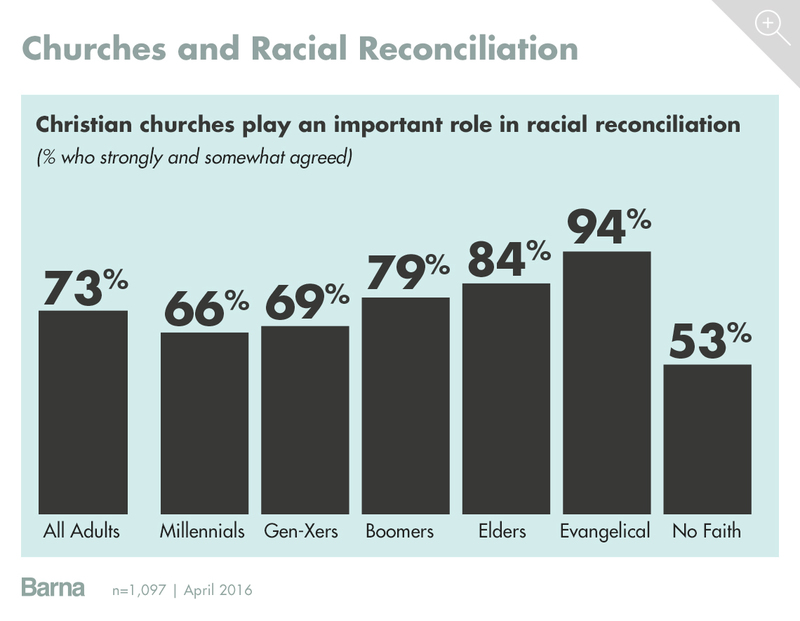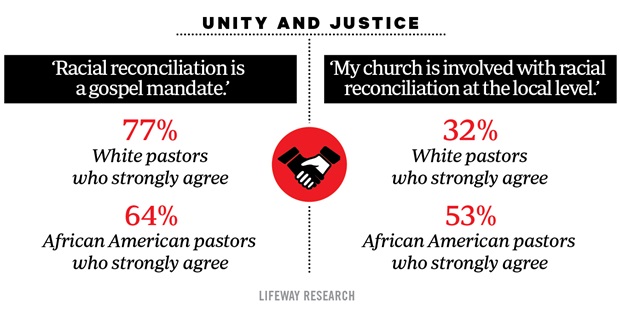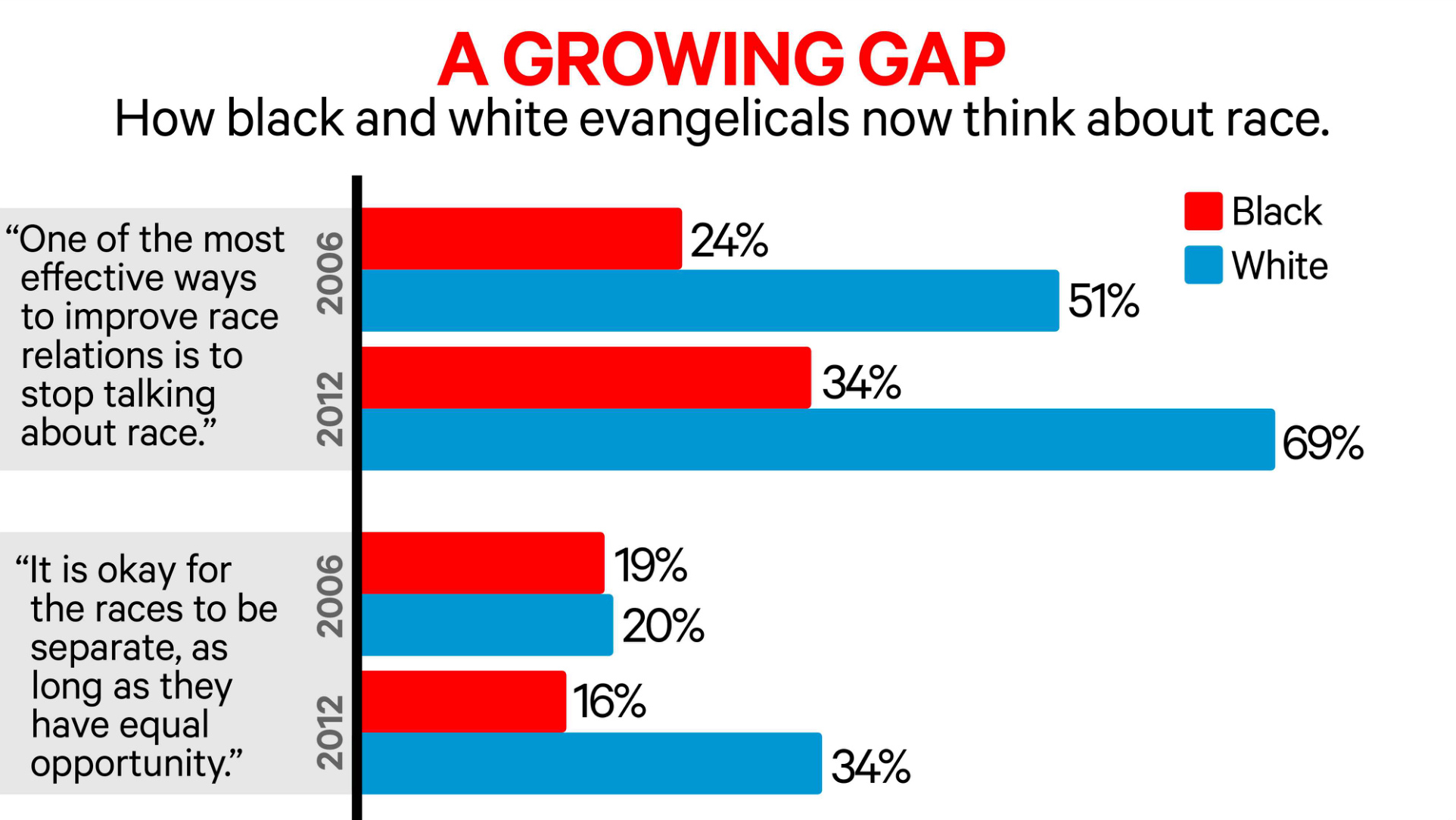When 16,000 college students gathered at InterVarsity Christian Fellowship’s latest Urbana conference to talk about missions, one of the main debates became how evangelicals should engage with the Black Lives Matter (BLM) movement.
In practice, they aren’t engaging much at all. Evangelicals are among the least likely of religious groups to support BLM, and the most likely to hold conservative positions on race, according to new research from Barna Group.
There are exceptions: One of the latest additions to the BLM camp is pastor and author John Piper.
This past December, many were surprised when worship director and BLM activist Michelle Higgins took the stage at Urbana.
“Black Lives Matter is not a mission of hate. It is not a mission to bring about incredible anti-Christian values and reforms to the world,” said Higgins, who directs worship and outreach at South City Church, a Presbyterian Church in America congregation in St. Louis, Missouri. “[BLM] is a movement on mission in the truth of God.”
Higgins’s speech sparked pushback from some evangelicals. The disagreement was covered by The New York Times (NYT), and InterVarsity itself released a statement noting that it “does not endorse everything attributed to #BlackLivesMatter.” Two black Christian academics—Anthony Bradley and George Yancey—also called on believers to distance themselves from the movement.
About 13 percent of evangelicals say they support BLM, less than half the share of practicing Christians (28%) or those who attended church in the past week (30%) who also do so. (Barna defines evangelical based upon adherence to nine theological points, instead of by self-identification or church attendance as in most polls. Practicing means respondents who self-identify as Christian, say their faith is important to them, and attend worship services at least once a month.)
The only religious group less supportive of BLM is practicing mainline Protestants, according to Barna numbers broken out for CT. Just nine percent support the movement.
Almost 1 in 4 evangelicals (23%) say they do not support the BLM movement, more than practicing Christians (13%) or those who attended church in the past week (14%).
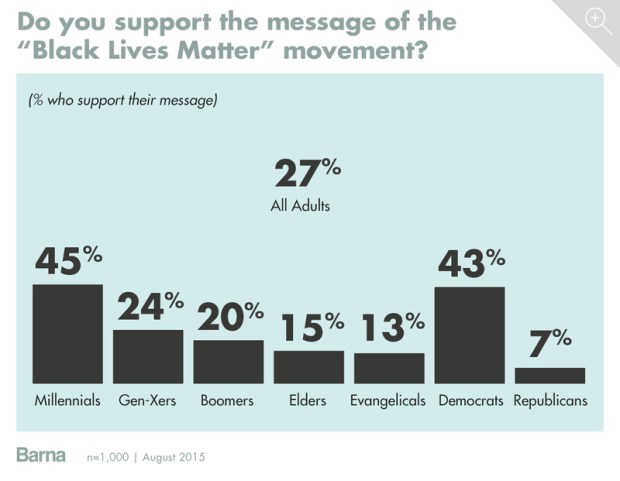
The Christians who do support BLM aren’t doing it very loudly. No evangelicals said they supported the movement on social media in the past week, and none reported attending a march, protest, or meeting related to the cause. Just four percent of practicing Christians and five percent of those who attended church in the past week supported the BLM movement on social media, while only three percent of those who attended church in the past week said they had attended a march, protest, or a meeting related to the cause.
On the other hand, more than three out of four evangelicals (76%) say they “believe all lives matter,” a reaction to BLM which has been used by some, including President Obama, to voice support for law enforcement. About half of practicing Christians (52%) and those who attended church in the past week (51%) agreed.
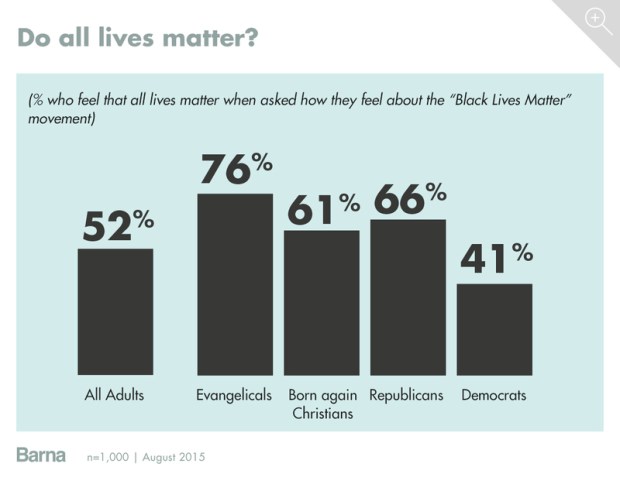
In a separate survey completed last summer, Barna also investigated the perception of race relations and the role of churches:
- More than half of evangelicals strongly or somewhat agreed (56%) that people of color are often put at a social disadvantage because of their race, compared with about two-thirds of practicing Christians (64%) and those who attend church at least once a week (66%).
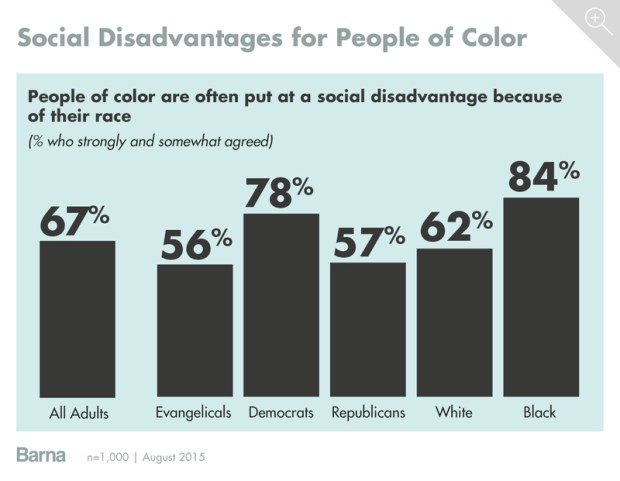
- About a third of evangelicals (35%) believe racism is a problem of the past; 13 percent of them believe it strongly. About a quarter of practicing Christians (26%) and those who attend church weekly (29%) somewhat or strongly agree that racism is a problem of the past.
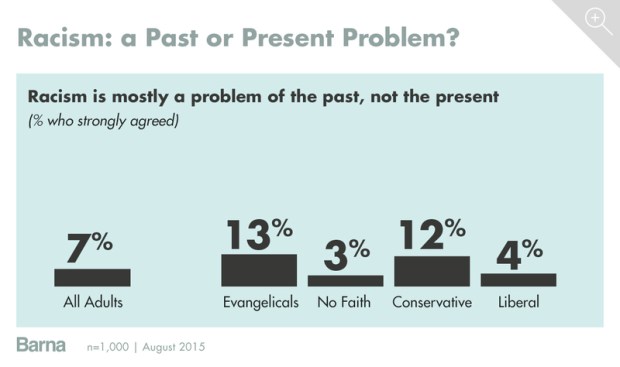
- The majority of evangelicals (60%), practicing Christians (69%), and those who attended church in the past week (69%) said that reverse racism is a problem in our society today.
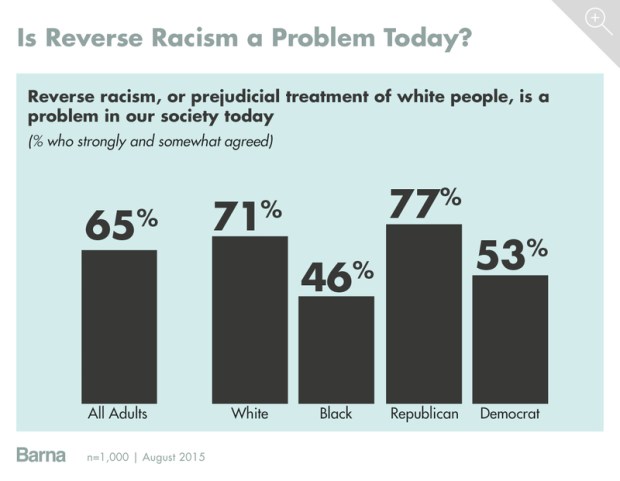
- More than 4 out of 5 evangelicals (84%), practicing Christians (85%), and those who attended church in the past week (85%) said there was a lot of anger and hostility among the different ethnic and racial groups in America today.
- More than half of evangelicals (54%), practicing Christians (62%), and those who attended church in the past week (63%) strongly or somewhat agree that state and federal laws are applied impartially to people of every ethnicity.
Few Christians saw the church as the source of those divisions. About one quarter of evangelicals (24%), practicing Christians (26%), and those who attended church in the past week (30%) said that churches are part of the problem when it comes to racism.
Few strongly agreed: only five percent of evangelicals, eight percent of practicing Christians, and nine percent of those who attended church in the past week.
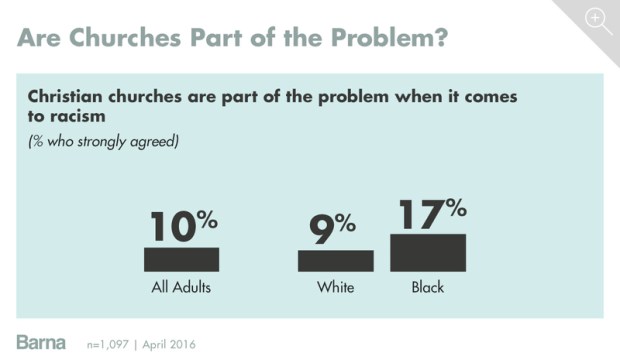
Those who don’t attend regularly are more skeptical. Overall, about 4 out of 10 Americans (38%), including 43 percent of black respondents and 40 percent of all non-white respondents, strongly or somewhat agreed that churches are part of the problem.
The overwhelmingly majority, however, saw churches as having a critical role to play in healing relationships between races.
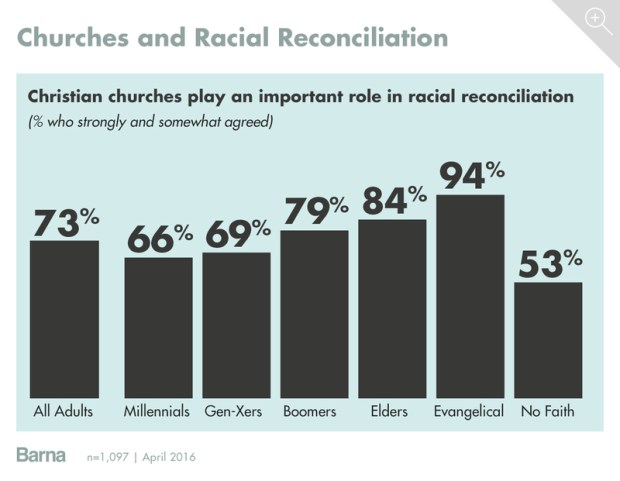
About 9 in 10 evangelicals (94%), practicing Christians (88%), and those who attended church in the past week (86%) said that churches play an important role in racial reconciliation.
Americans as a whole (73%) also overwhelmingly supported the church playing this role, including 77 percent of black respondents and 71 percent of all non-white respondents.
The role that multiethnic churches can play in healing America’s racial tensions drew debate among evangelicals over the past week.
In an essay for the NYT, Ethics and Religious Liberty Commission (ERLC) president Russell Moore called on white evangelicals to disavow the “nativism and bigotry all over the country.”
The “supposedly idyllic Mayberry of white Christian America” isn’t something to look back on nostalgically, wrote Moore. “That world was murder, sometimes literally, for minority evangelicals. This has gospel implications not only for minorities and immigrants but for the so-called silent majority. A vast majority of Christians, on earth and in heaven, are not white and have never spoken English.”
Moore’s comments were criticized by Duke Divinity professor (and CT columnist) Christena Cleveland, who argued that Moore’s “‘wake-up’ call has more to do with the panic around Trump than actual justice.” (Read her tweets.)
“Evangelicalism/Christianity is still white because whites hold all of the power,” Cleveland tweeted. “Black/brown spaces are the center of gravity for Christianity, but white spaces are still the center of Christian power…There’s no discussion of power dynamics or call to white Christians to abdicate power. Instead, there’s a call for more multiethnic churches—which are long known to be transmitters of white supremacy.”
[CT has reported on how African Americans in multiethnic churches appear to “start to think more like whites about the origins of inequality.”]
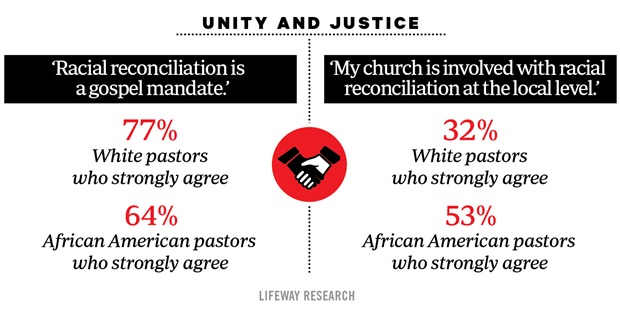
The same day Moore’s essay was published, Desiring God’s Piper explained on his podcast how his stance on BLM has changed.
At first, Piper was reticent to support BLM when he visited BlackLivesMatter.com and noted that the site’s three women founders were “queer-affirming and transgender-affirming.”
But Piper’s views shifted after speaking with Anacostia River Church pastor Thabiti Anyabwile, who told Piper that the website is distinct from the movement and that Piper’s inferences (and his tweet) were “unhelpful.”
Piper also encouraged white evangelicals to “pause” before saying anything like, “All lives matter.”
“Because if you quickly add that, it sounds like a rebuke,” he said. “It sounds like a minimizing of what was just said. It sounds like the point that was trying to be made isn’t worth being made,” he said. “… Of course that is true, all lives matter, but oh how timing matters and how context matters.”
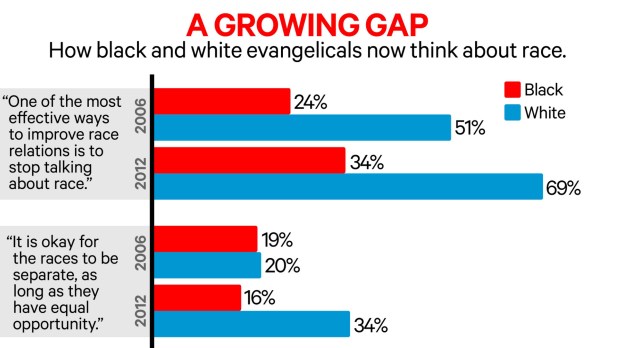
Also last week, Southern Baptist Theological Seminary professor Jarvis Williams released a list of 10 ways a church can avoid becoming “an unhealthy, multiethnic church plantation.”
CT has previously examined how black and white Christians increasingly think differently about race, the ERLC’s 2015 racial reconciliation summit, what pro-life activists and the BLM movement have to learn from one another, and why presidential candidates—and Christians—can’t ignore it.

